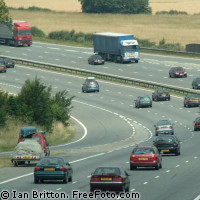Renault joins Transport Research Arena 2008 to solve road transport paradox
'All the transport stakeholders must be mobilised if we want to find efficient solutions to the transport paradox we currently face today,' Michel de Virville, the Secretary General of French car maker Renault, has told CORDIS News. The paradox in question is our increasing need for mobility and more consumer goods on the one hand, and our concern for the impact that these demands are having on our environment on the other. As road transport is still the most widely used form of transport, and estimates suggest that by 2020 there will be a 32% increase in passenger traffic and a 69% rise in the transport of goods, the big issue is how to minimise its impact on climate change while ensuring sustainable mobility. 'We are all concerned about the effect the increase in traffic in our cities and on our roads is having on our environment,' said Mr de Virville. 'Therefore, we must take the necessary action to have all the advantages of more mobility, without taking the risk of seeing the negative consequences of this increase in road transport.' Precisely for these reasons, the French vehicle manufacturer will be participating in the second Transport Research Arena conference to be held in Ljubljana, Slovenia, from 21 to 24 April 2008. Co-organised by the European Road Transport Research Advisory Committee (ERTRAC) and the European Commission, the aim of Transport Research Arena 2008 will be to bring together road transport stakeholders to discuss both climate change and mobility, as well as road safety. 'At Renault we are very much in favour of the Transport Research Arena and its practical and integrated approach of bringing together all stakeholders, from researchers, industry and public authorities, to work together in synergies so as to find solutions to the many challenges ahead of us,' he explained. 'We see this approach as essential if we are to develop intelligent transport and avoid the negative effects of increased mobility,' he added. In fact, as a large investor in research and development (R&D), Renault has already pioneered innovative partnerships and technologies. Through its alliance with the Japanese car maker Nissan, it has developed flexible-fuel engine technology, for example, which features a highly versatile engine that can run on fuel containing petrol and ethanol in any proportion (0% to 100% of either). In addition to its plan to sell a million cars a year with a CO2 emissions threshold of under 140 grams per kilometre by 2008, the company is also working on the zero-emission electric car of the future using lithium ion batteries, which it hopes to commercialise between 2010 and 2012. 'At Renault our research focuses on developing very sophisticated technology to reduce the CO2 emissions of all our cars,' said the Secretary General. 'We are also the car manufacturer with the largest number of models achieving the maximum five star rating in EuroNCAP crash tests. And for these reasons, we are very interested in the Transport Research Arena 2008, because we have proposals to make and solutions to bring to the critical concerns of climate change and traffic safety.' According to the EU's Science and Research Commissioner, Transport Research Arena 2008 will provide an ideal forum to promote all European road research efforts. 'It is by finding and exploiting synergies with other stakeholders that European car makers will maintain their place in European industry. TRA 2008 will cover all aspects of road transport research. This is all about the sector getting together to identify its research needs. It means that there is a strategic plan for the sector, leading to better, more efficient use of resources and ensuring that research delivers what is needed. This also means combining and coordinating European, national, regional and private research actions, and improving the networking, clustering and pooling of research and development capacities,' he said. The second European Road Transport Research Arena conference has as its slogan 'Greener, safer and smarter transport for Europe'. With a focus on climate change and road safety, the conference programme will be organised in several plenary, strategic and thematic sessions based on European road research needs and agendas.



